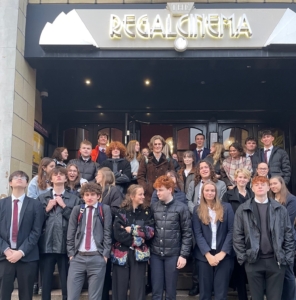Barbenheimer Trip
Last week, my classmates and I embarked on a cinematic extravaganza that would alter us perhaps more than we were ever expecting: Barbenheimer. This iconic phenomenon in cinematic history combined the bubble-gum pink feminist comedy of Barbie with the ground-shuddering political thriller of Oppenheimer in an intense five-hour session. As we settled in to our plush seats, snacks and drinks firmly in hand, it’s safe to say we were quite unprepared for how this movie marathon was going to shake us to our core and make us question the fabric of our own reality.
We wisely began with Barbie. I had already seen and loved Barbie and pretty much recommended it to everyone I know, so I was prepared for the emotional rollercoaster I was about to experience. Writer, director and overall genius Greta Gerwig manages to reverse the roles that men and women play in the media, with the Barbies as the strong, diverse, clear-headed heroines and the Kens as the ditsy love interests who “only had a good day if Barbie looked at him” as Helen Mirren, the narrator, quips. Barbie is a comforting hug to female feminist viewers who have been looking for a film such as this their entire lives, and an incredibly accessible educational experience for those who are new to feminism and/or those who don’t experience sexism. What encouraged me most exiting the theatre was Dr Smith’s comment that it allowed him to evaluate and improve the way he interacts with his female students, wife, daughter and all women in general – I realised in this moment just how important this film is and how valuable delivering someone else’s experience to the viewer is.
We then were seated for Oppenheimer. My friends had already seen it, unlike myself, and were practically shaking with anticipation, so I knew I was in for a journey. Post-Oppenheimer, I found myself completely flawed and unable to express what I had experienced, one of the reasons I have not gone into as much detail with this film. In our discussion afterwards, my friends, Dr Smith and I make a connection to this experience with one of a religious nature and William James’ condition of ineffability – in other words, the inability to verbally express your experience (whether that be with God or Oppenheimer). The tense three-hour experience made us question the human condition with respect to destruction and genocide, the corrupt foundations of governments of the time (which is arguably just as applicable today) and ideas of ego in relation to morality. I was so moved by it that, that night, I booked tickets for myself and my parents to go the next day, wherein we then had our own fascinating discussions.
To conclude, this trip truly made me consider most aspects of our society and thoroughly engaged me for our lessons in the following weeks on Wittgenstein and the way in which we use language. My friends and I joke about how I, like Wittgenstein, had my own paradigm shift and became ‘Second Hope’ after experiencing Barbenheimer.
Hope, Year 13 student





